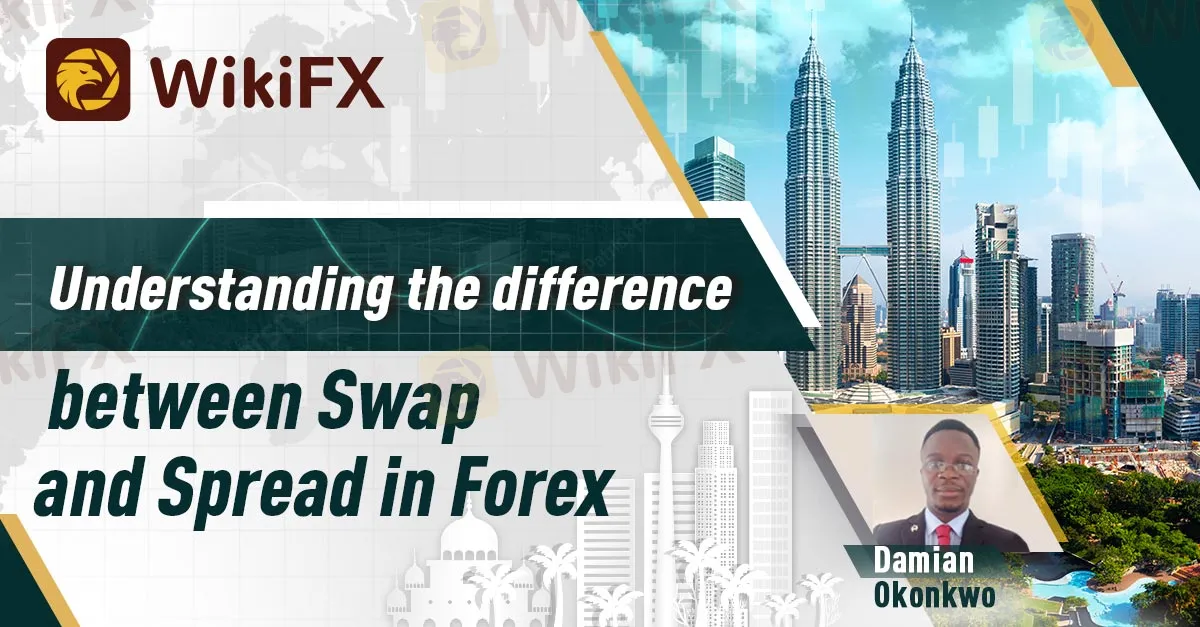简体中文
繁體中文
English
Pусский
日本語
ภาษาไทย
Tiếng Việt
Bahasa Indonesia
Español
हिन्दी
Filippiiniläinen
Français
Deutsch
Português
Türkçe
한국어
العربية
Understanding the difference between Swap and Spread in Forex
Abstract:Spread and swap generally reduce the trader's profits and available margin for trading. Only on a few occasions does the swap come as positive. The spread refers to the broker's commission for services rendered while the swap refers to the cost of holding overnight positions in the market.

By: Damian Okonkwo
What is spread?
The term spread used in forex refers to the difference between the broker's offering prices and the actual market price of the financial instrument they offer to their clients. Spread is the extra costs added to the prices of various financial instruments traded in the market by the broker while offering it to their clients which serves as his commission for services rendered. We can further define spreads as the difference between the bid and ask prices of the various financial instruments traded in the forex market today.
What is swap?
Swap is the cost of holding overnight positions in the market. Usually, some brokers place an additional cost on the trader's position when he leaves his position open at the close of each market day. The swap charges could be positive or negative depending on the interest rate for the currency pair traded.
Major difference between Swap and Spread
| Swap | Spread |
| Cost for overnight positions | Broker's commission for each position taken. |
| Could be positive or negative | Always negative |
| Depends on the interest rate of the pair traded | Depends on the type of instrument traded |
| Keeps increasing based on the number of days the position is held. | Charged once when the position is opened |
How do swaps and spreads affect the trader's position in forex?
Generally, both the spread and swap affect the trader's position negatively. Only on a few occasions does the swap come as positive. Aside from these rare occasions, both the spread and swap are known to reduce the trader's profits and available margin for trading.

Disclaimer:
The views in this article only represent the author's personal views, and do not constitute investment advice on this platform. This platform does not guarantee the accuracy, completeness and timeliness of the information in the article, and will not be liable for any loss caused by the use of or reliance on the information in the article.
Read more

Why More People Are Trading Online Today?
Discover why online trading is booming with tech, AI, and a push for financial freedom. From stocks to crypto, it’s a thrilling hustle for all.

RM457,000 Forex Fraud: Court Grants Conditional Release, Is Justice Delayed?
A Malaysian magistrate’s court has issued a discharge not amounting to acquittal (DNAA) for two former directors of an investment company implicated in a forex investment fraud case involving RM457,735.50.

Gold Surges to New Highs – Is It Time to Buy?
Recently, gold prices have once again set new records, surpassing $3,077 per ounce and continuing a four-week winning streak. Is It the Right Time to Invest?

Why Does the Yen's Exchange Rate Fluctuate Repeatedly?
JPY Exchange Rate Fluctuations: How Should Investors Respond?
WikiFX Broker
Latest News
Enlighten Securities Penalized $5 Million as SFC Uncovers Risk Control Failures
Why Are Financial Firms Adopting Stablecoins to Enhance Services and Stability?
Experienced Forex Traders Usually Do This Before Making a Lot of Money
Octa vs XM:Face-Off: A Detailed Comparison
When High Returns Go Wrong: How a Finance Manager Lost RM364,000
Bridging Trust, Exploring Best—WikiEXPO Hong Kong 2025 Wraps Up Spectacularly
Interactive Brokers Expands Crypto Trading with Solana, XRP, Cardano, and Dogecoin
Fidelity Investments Explores Stablecoin Innovation in Digital Assets Sector
Why More People Are Trading Online Today?
SEC Ends Crypto.com Probe, No Action Taken by Regulator
Currency Calculator







